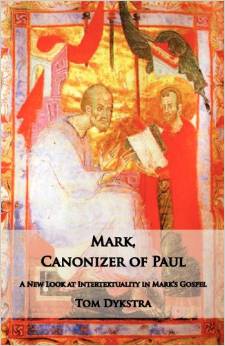 One book I enjoyed reading this year was Tom Dykstra’s Mark, Canonizer of Paul. (The link is to an earlier post of mine on this title.) I see the book has been promoted on the Bible and Interpretation site, too. Tom Dykstra begins with a discussion of Mark’s sources and purpose referring to about half a dozen books that were still fresh in my mind from recent reading and introducing me to as many more that by and large I followed up subsequently. His third chapter is titled The Chimera of Oral Tradition.
One book I enjoyed reading this year was Tom Dykstra’s Mark, Canonizer of Paul. (The link is to an earlier post of mine on this title.) I see the book has been promoted on the Bible and Interpretation site, too. Tom Dykstra begins with a discussion of Mark’s sources and purpose referring to about half a dozen books that were still fresh in my mind from recent reading and introducing me to as many more that by and large I followed up subsequently. His third chapter is titled The Chimera of Oral Tradition.
“Oral Tradition” is a term one soon learns to take for granted when reading any scholarly work that attempts to explore the possible sources used by the authors of the gospels. If one wants to pursue this concept further one will soon enough find interdisciplinary studies drawing upon the works of anthropologists, oral historians — names like Ong, Vansina, Foley, Dundes, Kelber will soon become familiar. There is no shortage of information about “how oral tradition works” but none of it directly explains how we know the gospel authors (evangelists) drew upon it.
(There are arguments that certain structures in the gospels are paralleled in oral recitations but these arguments are off-set by even more detailed and supported demonstrations that the same structures are found in literary works, too. They are not unique to oral story-telling.)
This becomes all the more frustrating as one continues to read widely and learns that there are numerous studies that easily demonstrate that the evangelists drew upon certain other written literature for some of their episodes. It is very difficult to deny that the account of Jesus raising the daughter of Jairus from the dead owes nothing to the similar narrative of Elisha raising a young boy from death.
Numerous commentaries suggest that the author of the Gospel of Matthew was emulating the story of the ancient Law being presented to Israel through Moses on the mountain when he composed the Sermon on the Mount. One scholar even published an entire book arguing for numerous links between the Jesus in Matthew’s gospel and Moses — clearly leading us to acknowledge that the evangelist was consciously drawing upon the story of Moses to write his gospel.
So how do we reconcile these studies with the claim that oral traditions were the gospel sources? Continue reading “How do we know the stories of Jesus were preserved by oral tradition before the Gospels?”

